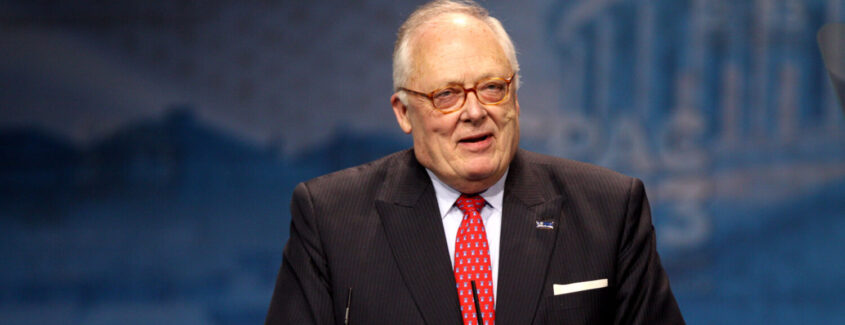
Edwin (Ed) Feulner, Jr., Ph.D., was one of those special individuals whose influence on our lives far exceeded his fame. Best known in conservative circles as one of the two co-founders (along with the late Paul Weyrich) of the Heritage Foundation, Dr. Feulner was arguably the preeminent architect of the conservative public policy think-tank movement. In addition to Heritage, Feulner helped to launch such vibrant and influential organizations as the State Policy Network, the Philadelphia Society, and the American Legislative Exchange Council. These organizations comprised much of the institutional infrastructure by which conservative ideas and values were applied to current public policy issues.
Feulner was a visionary. Founding Heritage in 1973 (the year he turned 32 years old), what started as a nine-man team grew and grew. With Ed as its president from 1977 until 2013, Heritage became famous for publishing clear, concise papers explaining how the core beliefs of the American founding – free enterprise, limited government, strong national defense – could be translated into policies appropriate for our time. Under his leadership, Heritage grew to somewhere between 500 and 1,000 employees.
I had my own “close encounter” with Heritage in 1984. Having just completed my doctorate in economics while marrying my wife and adopting my daughter the previous year, the fine English scholar, Stuart Butler, offered me a job as a policy analyst at Heritage. I was honored, to say the least. But there was a practical problem: The pay offered to me was $20,000 per year. Remember, this was 1984. Mortgage rates were 15-16% at the time. My family and I were paying off a 2700-square foot house in the bucolic Pennsylvania countryside. A comparable property anywhere within commuting distance of Washington would cost almost three times as much. Financing such a mortgage while making only $20,000 per year (pre-withholding) rendered a move to D.C. unaffordable, and so I had to decline the offer.
The Heritage Foundation was still young in 1984. Today, Heritage pays their summer interns $18 per hour, which would equate to $36,000 for a 50-week year at 40 hours per week. Of course, $36,000 today might not be much different from $20,000 in 1984, but the point is, back then a policy analyst with a doctorate was being paid like an intern working toward a bachelor’s degree. I don’t mention this to imply that Heritage was cheap, but rather that it took years and years of patient building to get to where they are today.
With Ed Feulner steering the organization, Heritage punched way above its weight. Working behind the scenes, cranking out policy papers and distributing every one of them to members of Congress, Heritage had a profound impact on American public policy from the late 1970s onward.
The presidency of Ronald Reagan was in many ways an embodiment of Heritage’s idea. Decade after decade, Heritage shaped primarily the Republican Party, and in doing so, was a principal architect of the conservative-libertarian movement.
Another milestone was the collaboration of Heritage scholars with Newt Gingrich that led to the 1994 “Contract with America,” that paved the way for Republicans to have a majority in the House of Representatives for the first time in four decades.
A personal observation: I only met Ed Feulner in person once, although I attended several of his speeches over the years. In the early 2010s, he was visiting Grove City College. Outside Harbison Chapel, I found myself walking next to him. We had a warm exchange. It felt like we were old friends. He was gifted with an easy-going, friendly personality – so down-to-earth, genuine, and accessible. There was no self-importance, no sense of heaviness or burden. He was at peace with himself – a very likable man who exuded the true-blue American values that he preached.
How blessed our country was to have this great man using his considerable intellectual and organizational talents to help preserve and promote all that is great about our country. God bless you, Ed Feulner. RIP.

